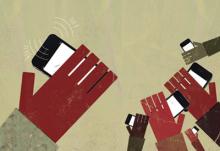An activist in Phoenix launches a website -- and supports a revolution on the other side of the world.
organizing tools
Using online and wireless communication to organize large, diverse groups of people has been a key component of the nonviolent Arab Spring uprisings.
In recent weeks, Facebook and other social media have clearly demonstrated their capacity to do far more than just allow us to keep in touch with our family and friends. They have proven to be powerful organizing tools, capable of assisting in the creation of broad international movements for social change. Social media has proven to be a particularly powerful tool in countries in which basic democratic rights such as a free press and the right to assembly are severely restricted. At the same time, Facebook and YouTube are increasingly rendering international borders as meaningless. Western media coverage of the recent popular uprising in Egypt consistently emphasized the catalytic role of Facebook in galvanizing youth and young adults to take action against an entrenched regime that had long been viewed as impenetrable. In the days after Mubarak's departure, both the New York Times and The Los Angeles Times published lead stories describing the role of certain Facebook pages in not only serving as a call to action, but as a space in which emerging activists in Tunisia and Egypt were able to share lessons with each other. These young activists had not only managed to evade the reach of both nations' security police, they had also sidelined older opposition parties such as the Muslim Brotherhood in Egypt.
